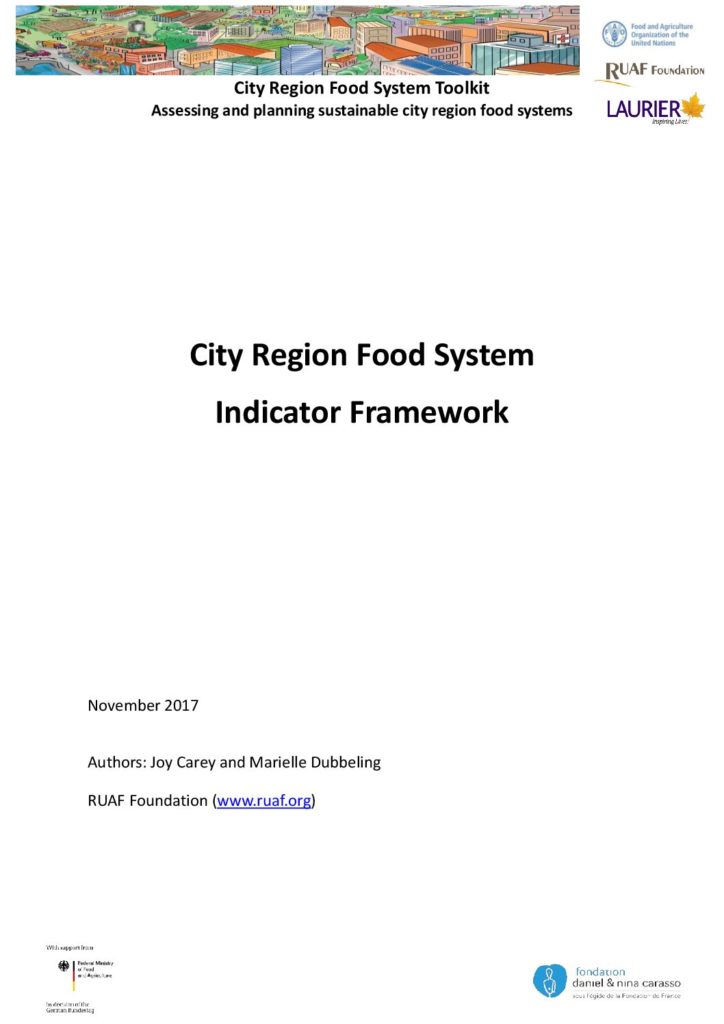Purpose
The City Region Food System (CRFS) indicator framework is a practical assessment and
planning tool designed to help cities to:
- Assess the current status and performance of a city region food system following a whole-system approach
- Identify priority areas for action with clear desired outcomes and ways of measuring change
- Help with planning strategy and action to achieving the desired outcomes
- Establish baselines and monitor changes resulting from (future) policy and programme implementation.
Context
A city might wish to make use of this tool to assemble information in response to the following
‘big picture’ questions about the longer term sustainability and resilience of the city region
food system:
- Who feeds the city region and where does the food come from that is consumed in the city region?
- What are the strengths and vulnerabilities of the current city region food system?
- To what extent is the current city region food system (and the different components of the food system) resilient to shocks and projected circumstances in the longer-term?
- Which areas of the city region, what parts of the food chain and which groups of residents/involved stakeholders would be most adversely affected by vulnerabilities in the food system?
- What are the priority areas that need to be addressed in order to develop a more sustainable and resilient city region food system for the future (in relation to different sustainability and food systems areas and dimensions)?
- What role and powers do the city and city region decision-makers and key stakeholders have in shaping a more sustainable/resilient food system that serves the city region? How can these roles be enhanced/made more equitable?
Audience
The tool is aimed at those undertaking food system analyses of sustainability and planning for
future resilience at a city and city region level. Areas of interest for a city or city region might
be, for example to:
- Develop and strengthen the city region food production capacity and potential
- Optimise regional food processing capacity (that meet food safety standards and provide healthy and sustainable food to the population
- Retain more of the “local food dollar” and position the city region agri-food sector to contribute directly to the regional economy;
- Increase environmental sustainability and resilience of the city region food system;
- Develop, implement and monitor improved and more resilient city region food policies and strategies.
Origins and development
The indicator framework has been developed around 21 key “desired direction of travel” areas
that characterise a more sustainable and resilient city region food system (‘A Vision for City Region Food Systems’, FAO & RUAF Region Food Systems’). Following initial work at two Expert Meetings organised in Rome (March 2015 and April 2016) in Rome (March 2015 and April 2016) a set of 210 indicators/measures has been com piled to help measure both baseline data and ongoing progress towards these desired food system sustainability and resilience changes. The framework further builds on experiences from its application by local team in seven cities on different continents.
Taking a ‘whole food system’ approach, the indicators are based on a matrix of food system
dimensions: the sustainability areas that reflect the multifunctional nature of the food system;
and ii) the components of the whole food system (from production th rough to waste, and also
food system policy and planning).
Deciding on the most relevant research questions is an important early stage in shaping the
assessment process, leading eventually to the selection of the most relevant indicators.
This City Region Food System Indicator Framework is part of the City Region Food Systems
(CRFS) toolkit to assess and plan sustainable city region food systems. The toolkit has been
developed by FAO, RUAF Foundation and Wilfrid Laurier University with the financial support
of the German Federal Ministry of Food and Agriculture and the Daniel and Nina Carasso
Foundation.

